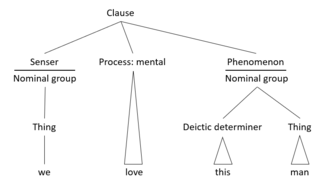Related Research Articles

Functional linguistics is an approach to the study of language characterized by taking systematically into account the speaker's and the hearer's side, and the communicative needs of the speaker and of the given language community. Linguistic functionalism spawned in the 1920s to 1930s from Ferdinand de Saussure's systematic structuralist approach to language (1916).

Language is a structured system of communication that consists of grammar and vocabulary. It is the primary means by which humans convey meaning, both in spoken and written forms, and may also be conveyed through sign languages. The vast majority of human languages have developed writing systems that allow for the recording and preservation of the sounds or signs of language. Human language is characterized by its cultural and historical diversity, with significant variations observed between cultures and across time. Human languages possess the properties of productivity and displacement, which enable the creation of an infinite number of sentences, and the ability to refer to objects, events, and ideas that are not immediately present in the discourse. The use of human language relies on social convention and is acquired through learning.
The following outline is provided as an overview and topical guide to linguistics:
In linguistics, transformational grammar (TG) or transformational-generative grammar (TGG) is part of the theory of generative grammar, especially of natural languages. It considers grammar to be a system of rules that generate exactly those combinations of words that form grammatical sentences in a given language and involves the use of defined operations to produce new sentences from existing ones. The method is commonly associated with American linguist Noam Chomsky.
In functional-cognitive linguistics, as well as in semiotics, iconicity is the conceived similarity or analogy between the form of a sign and its meaning, as opposed to arbitrariness. The principle of iconicity is also shared by the approach of linguistic typology.
William Labov is an American linguist widely regarded as the founder of the discipline of variationist sociolinguistics. He has been described as "an enormously original and influential figure who has created much of the methodology" of sociolinguistics.
Language change is variation over time in a language's features. It is studied in several subfields of linguistics: historical linguistics, sociolinguistics, and evolutionary linguistics. Traditional theories of historical linguistics identify three main types of change: systematic change in the pronunciation of phonemes, or sound change; borrowing, in which features of a language or dialect are altered as a result of influence from another language or dialect; and analogical change, in which the shape or grammatical behavior of a word is altered to more closely resemble that of another word.
Principles and parameters is a framework within generative linguistics in which the syntax of a natural language is described in accordance with general principles and specific parameters that for particular languages are either turned on or off. For example, the position of heads in phrases is determined by a parameter. Whether a language is head-initial or head-final is regarded as a parameter which is either on or off for particular languages. Principles and parameters was largely formulated by the linguists Noam Chomsky and Howard Lasnik. Many linguists have worked within this framework, and for a period of time it was considered the dominant form of mainstream generative linguistics.
In linguistics, linguistic competence is the system of unconscious knowledge that one knows when they know a language. It is distinguished from linguistic performance, which includes all other factors that allow one to use one's language in practice.
Glossematics is a structuralist linguistic theory proposed by Louis Hjelmslev and Hans Jørgen Uldall although the two ultimately went separate ways each with their own approach. Hjelmslev’s theory, most notably, is an early mathematical methodology for the analysis of language which was subsequently incorporated into the analytical foundation of current models of functional—structural grammar such as Danish Functional Grammar, Functional Discourse Grammar and Systemic Functional Linguistics. Hjelmslev’s theory likewise remains fundamental for modern semiotics.
In linguistics and social sciences, markedness is the state of standing out as nontypical or divergent as opposed to regular or common. In a marked–unmarked relation, one term of an opposition is the broader, dominant one. The dominant default or minimum-effort form is known as unmarked; the other, secondary one is marked. In other words, markedness involves the characterization of a "normal" linguistic unit against one or more of its possible "irregular" forms.
Two types of language change can be characterized as linguistic drift: a unidirectional short-term and cyclic long-term drift.
In historical linguistics, grammaticalization is a process of language change by which words representing objects and actions become grammatical markers. Thus it creates new function words from content words, rather than deriving them from existing bound, inflectional constructions. For example, the Old English verb willan 'to want', 'to wish' has become the Modern English auxiliary verb will, which expresses intention or simply futurity. Some concepts are often grammaticalized, while others, such as evidentiality, are not so much.

Joan Lea Bybee is an American linguist and professor emerita at the University of New Mexico. Much of her work concerns grammaticalization, stochastics, modality, morphology, and phonology. Bybee is best known for proposing the theory of usage-based phonology and for her contributions to cognitive and historical linguistics.
Structural linguistics, or structuralism, in linguistics, denotes schools or theories in which language is conceived as a self-contained, self-regulating semiotic system whose elements are defined by their relationship to other elements within the system. It is derived from the work of Swiss linguist Ferdinand de Saussure and is part of the overall approach of structuralism. Saussure's Course in General Linguistics, published posthumously in 1916, stressed examining language as a dynamic system of interconnected units. Saussure is also known for introducing several basic dimensions of semiotic analysis that are still important today. Two of these are his key methods of syntagmatic and paradigmatic analysis, which define units syntactically and lexically, respectively, according to their contrast with the other units in the system.
Linguistics is the scientific study of language. The modern study of linguistics is called a science because it entails the comprehensive, systematic, objective, and precise analysis of all aspects of language — cognitive, social, environmental, and biological, as well as structural. Before the 20th century, linguistics was not considered a scientific discipline.

In linguistics, the term formalism is used in a variety of meanings which relate to formal linguistics in different ways. In common usage, it is merely synonymous with a grammatical model or a syntactic model: a method for analyzing sentence structures. Such formalisms include different methodologies of generative grammar which are especially designed to produce grammatically correct strings of words; or the likes of Functional Discourse Grammar which builds on predicate logic.
Panchronic phonology is an approach to historical phonology. Its aim is to formulate generalizations about sound changes that are independent of any particular language or language group.
The Usage-based linguistics is a linguistics approach within a broader functional/cognitive framework, that emerged since the late 1980s, and that assumes a profound relation between linguistic structure and usage. It challenges the dominant focus, in 20th century linguistics, on considering language as an isolated system removed from its use in human interaction and human cognition. Rather, usage-based models posit that linguistic information is expressed via context-sensitive mental processing and mental representations, which have the cognitive ability to succinctly account for the complexity of actual language use at all levels. Broadly speaking, a usage-based model of language accounts for language acquisition and processing, synchronic and diachronic patterns, and both low-level and high-level structure in language, by looking at actual language use.
In linguistics, the autonomy of syntax is the assumption that syntax is arbitrary and self-contained with respect to meaning, semantics, pragmatics, discourse function, and other factors external to language. The autonomy of syntax is advocated by linguistic formalists, and in particular by generative linguistics, whose approaches have hence been called autonomist linguistics.
References
- 1 2 3 Vicentini, Alessandra (2003). "The economy principle in language. Notes and observations from early modern English grammars". Mots. Words. Palabras. 3: 37–57. CiteSeerX 10.1.1.524.700 . Retrieved 2023-06-03.
- ↑ Daneš, František (2003). "The double basis of the Prague functional approach". Language and Function: To the Memory of Jan Firbas. John Benjamins. pp. 57–70. ISBN 9027215588 . Retrieved 2023-06-03.
- ↑ MacWhinney, Brian; Mal'čukov., Andrej; Moravcsik, Edith (2014). Competing Motivations in Grammar and Usage. OUP. Retrieved 2023-06-03.
- ↑ Haspelmath, Martin (2021). "Explaining grammatical coding asymmetries: Form–frequency correspondences and predictability" (PDF). Journal of Linguistics. 57 (3): 605–633. doi:10.1017/S0022226720000535. S2CID 234127039 . Retrieved 2023-06-08.
- ↑ Labov, William (1994). Principles of Linguistic Change, Volume 1: Internal Factors. Wiley. ISBN 978-0-631-17914-6.
- ↑ Kroch, Anthony (1989). "Reflexes of grammar in patterns of language change" (PDF). Language Variation and Change. 1 (3): 199–244. doi:10.1017/S0954394500000168. S2CID 13832469 . Retrieved 2023-06-03.
- ↑ Croft, William (1995). "Autonomy and functionalist linguistics". Language. 71 (3): 490–532. doi:10.2307/416218. JSTOR 416218.